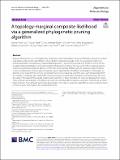| dc.contributor.author | Jun, Seong-Hwan | |
| dc.contributor.author | Nasif, Hassan | |
| dc.contributor.author | Jennings-Shaffer, Chris | |
| dc.contributor.author | Rich, David H. | |
| dc.contributor.author | Kooperberg, Anna | |
| dc.contributor.author | Fourment, Mathieu | |
| dc.contributor.author | Zhang, Cheng | |
| dc.contributor.author | Suchard, Marc A. | |
| dc.contributor.author | Matsen, Frederick A. | |
| dc.date.accessioned | 2023-08-16T20:50:11Z | |
| dc.date.available | 2023-08-16T20:50:11Z | |
| dc.date.issued | 2023-07-31 | |
| dc.identifier.uri | https://hdl.handle.net/1721.1/151771 | |
| dc.description.abstract | Abstract
Bayesian phylogenetics is a computationally challenging inferential problem. Classical methods are based on random-walk Markov chain Monte Carlo (MCMC), where random proposals are made on the tree parameter and the continuous parameters simultaneously. Variational phylogenetics is a promising alternative to MCMC, in which one fits an approximating distribution to the unnormalized phylogenetic posterior. Previous work fit this variational approximation using stochastic gradient descent, which is the canonical way of fitting general variational approximations. However, phylogenetic trees are special structures, giving opportunities for efficient computation. In this paper we describe a new algorithm that directly generalizes the Felsenstein pruning algorithm (a.k.a. sum-product algorithm) to compute a composite-like likelihood by marginalizing out ancestral states and subtrees simultaneously. We show the utility of this algorithm by rapidly making point estimates for branch lengths of a multi-tree phylogenetic model. These estimates accord with a long MCMC run and with estimates obtained using a variational method, but are much faster to obtain. Thus, although generalized pruning does not lead to a variational algorithm as such, we believe that it will form a useful starting point for variational inference. | en_US |
| dc.publisher | BioMed Central | en_US |
| dc.relation.isversionof | https://doi.org/10.1186/s13015-023-00235-1 | en_US |
| dc.rights | Creative Commons Attribution | en_US |
| dc.rights.uri | http://creativecommons.org/licenses/by/4.0/ | en_US |
| dc.source | BioMed Central | en_US |
| dc.title | A topology-marginal composite likelihood via a generalized phylogenetic pruning algorithm | en_US |
| dc.type | Article | en_US |
| dc.identifier.citation | Algorithms for Molecular Biology. 2023 Jul 31;18(1):10 | en_US |
| dc.contributor.department | Center for Brains, Minds, and Machines | |
| dc.identifier.mitlicense | PUBLISHER_CC | |
| dc.eprint.version | Final published version | en_US |
| dc.type.uri | http://purl.org/eprint/type/JournalArticle | en_US |
| eprint.status | http://purl.org/eprint/status/PeerReviewed | en_US |
| dc.date.updated | 2023-08-06T03:12:31Z | |
| dc.language.rfc3066 | en | |
| dc.rights.holder | The Author(s) | |
| dspace.date.submission | 2023-08-06T03:12:31Z | |
| mit.license | PUBLISHER_CC | |
| mit.metadata.status | Authority Work and Publication Information Needed | en_US |
